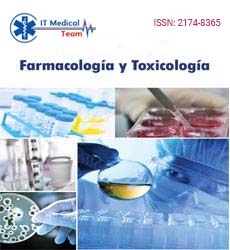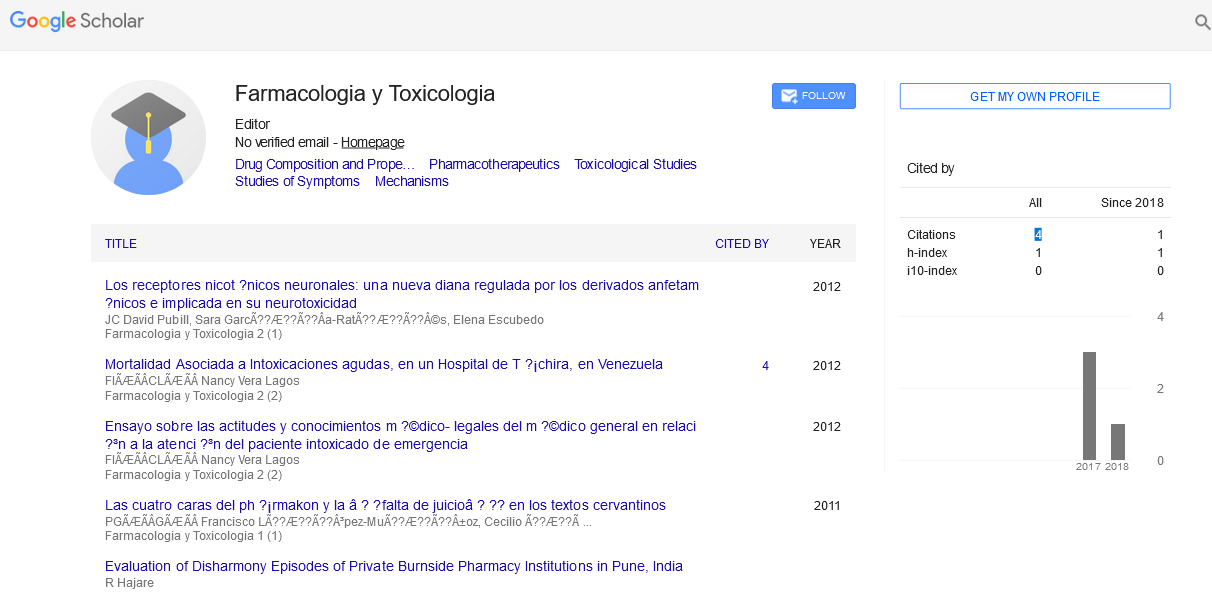Expert Review - (2023) Volume 13, Issue 2
A note on the Pharmacotherapeutics and its Medication's Role
Fang Zang Loa*
University of Tennessee Health Science Center, College of Medicine, Memphis, TN 38163, USA
*Correspondence:
Fang Zang Loa, University of Tennessee Health Science Center, College of Medicine, Memphis, TN 38163,
USA,
Email:
Received: 03-Apr-2023, Manuscript No. ipft-23-13650;
Editor assigned: 05-Apr-2023, Pre QC No. P-23-13650;
Reviewed: 19-Apr-2023, QC No. Q-23-13650;
Revised: 22-Apr-2023, Manuscript No. R-23-13650;
Published:
28-Apr-2023
Abstract
This article discusses the role of medications in healthcare and their
advantages and disadvantages. Medications are a crucial component
of modern healthcare, and they can be used to treat and manage a
wide range of illnesses and diseases, prevent illnesses, improve quality of
life, provide personalized treatment, save lives, and be a cost-effective
treatment option. However, medications also have the potential
to cause harm if not used properly, primarily through adverse drug
reactions and medication errors. Healthcare providers and patients
must work together to carefully consider the potential benefits and
risks of medication use, monitor patients closely for adverse effects,
and take steps to prevent medication errors. Despite the potential risks,
the benefits of medication use make them an essential tool in modern
healthcare.
Keywords
Medication; Healthcare; Drug Interactions
Introduction
Pharmacotherapeutics is the branch of medicine that
deals with the study of how drugs can be used to prevent,
diagnose, and treat diseases. It encompasses various
aspects of medication use, including drug development,
pharmacodynamics (how drugs affect the body),
pharmacokinetics (how drugs move through the body),
and pharmacogenetics (how genetic factors influence
drug response) [1]. The use of medications has become
an essential component of modern healthcare. With
the advancements in pharmacotherapeutics, there are
now numerous medications available to treat various
illnesses and diseases, ranging from common colds to
chronic conditions such as diabetes and hypertension [2].
Understanding the role of medications in healthcare is
crucial to improving patient outcomes and reducing the
burden of diseases. Pharmacotherapeutics begins with drug
development, which involves the discovery, design, and
testing of new drugs. The process of drug development is a
long and complex one that can take several years, involving
multiple stages, including preclinical studies, clinical trials,
and regulatory approval. Preclinical studies are conducted
in the laboratory to test the safety and efficacy of the drug
in animal models. Clinical trials involve testing the drug in
human subjects to evaluate its safety, efficacy, and optimal
dosages. Regulatory approval is obtained from government
agencies such as the Food and Drug Administration (FDA)
in the United States, which evaluates the safety and efficacy
of the drug before approving it for use. Pharmacodynamics
refers to how drugs interact with the body and produce
their therapeutic effects. Drugs can act on various targets in
the body, including enzymes, receptors, and ion channels,
to produce their effects. The efficacy of a drug depends on
its ability to bind to its target and produce a therapeutic
effect. Pharmacokinetics refers to how drugs move through
the body, including how they are absorbed, distributed,
metabolized, and eliminated. The pharmacokinetic profile
of a drug determines its dosing regimen, which is the
schedule and amount of medication that a patient should
take. Pharmacogenetics is the study of how genetic factors
can influence drug response. The genetic makeup of an
individual can affect how they metabolize drugs and how
they respond to medications. Pharmacogenetic testing
can help identify genetic variations that can affect drug
response, allowing healthcare providers to personalize
medication regimens for their patients [3, 4].
Discussion
Medications play an important role in modern healthcare
by preventing, managing, and treating a wide range of illnesses and diseases. However, like any medical
intervention, medications also have the potential to cause
harm if not used properly [5].
1. Disadvantages
The disadvantages of medication use primarily stem from
adverse drug reactions (ADRs), which are unwanted or
harmful effects that occur as a result of medication use.
ADRs can range from mild side effects such as nausea,
dizziness, or headaches, to more severe reactions such as
allergic reactions, organ damage, or even death [6, 7].
There are several factors that can increase the risk of ADRs,
including:
1.1. Incorrect dosing: Giving too much or too little
of a medication can increase the risk of ADRs.
1.2. Drug interactions: Taking multiple medications
at the same time can increase the risk of drug
interactions, which can lead to ADRs.
1.3. Patient factors: Age, weight, genetics, and other
patient factors can affect how medications are
metabolized and how patients respond to them.
To minimize the risk of ADRs, healthcare providers
must carefully consider the potential benefits and risks of
medication use and monitor patients closely for any signs of
adverse effects. Patients should also inform their healthcare
providers of any other medications or supplements they are
taking to avoid potential drug interactions [8].
In rare cases, medication errors can also occur, such as
prescribing the wrong medication or giving the wrong
dose. These errors can lead to serious harm and even
death. Healthcare providers must take steps to prevent
medication errors, such as double-checking medication
orders and ensuring that patients receive the correct
medication and dose [9, 10].
2. Advantages
Medications have numerous advantages in healthcare,
including:
1.4. Treating and managing illnesses: Medications
can be used to treat and manage a wide range of
illnesses and diseases, from acute conditions such
as infections and injuries to chronic conditions
such as diabetes, hypertension, and heart disease.
1.5. Preventing illnesses: Certain medications can be
used to prevent illnesses, such as vaccines, which
can prevent infectious diseases, and medications
that can reduce the risk of developing chronic
conditions.
1.6. Improving quality of life: Medications can
improve patients' quality of life by reducing
symptoms such as pain, nausea, and fatigue, and
improving their ability to carry out daily activities.
1.7. Personalized treatment: Advances in
pharmacogenetics and personalized medicine
have made it possible to tailor medication
regimens to individual patients' needs, improving
treatment outcomes and reducing the risk of
adverse effects.
1.8. Saving lives: Medications have played a crucial
role in improving survival rates for many diseases,
such as cancer, HIV, and heart disease.
1.9. Cost-effective: In many cases, medications can
be a cost-effective treatment option compared to
more invasive procedures or hospitalizations.
Medications play a vital role in modern healthcare, but
their use is not without risk. To minimize the risk of
adverse effects, healthcare providers and patients must
work together to carefully consider the potential benefits
and risks of medication use, monitor patients closely for
any signs of adverse effects, and take steps to prevent
medication errors.
Conclusion
Pharmacotherapeutics is a crucial aspect of modern
healthcare that involves the use of medications to prevent,
manage, and treat a wide range of illnesses and diseases.
Medications have numerous advantages, including treating
and managing illnesses, preventing illnesses, improving
quality of life, providing personalized treatment, saving
lives, and being a cost-effective treatment option. However,
medication use is not without risk, and adverse drug
reactions and medication errors can occur, leading to harm
and even death.
To minimize the risk of adverse effects, healthcare providers
must carefully consider the potential benefits and risks of
medication use, monitor patients closely for any signs of
adverse effects, and take steps to prevent medication errors.
This includes proper dosing, avoiding drug interactions,
and taking into account patient factors such as age, weight,
and genetics. Patients should also inform their healthcare
providers of any other medications or supplements they are
taking to avoid potential drug interactions.
In addition to these preventative measures, advances in
pharmacogenetics and personalized medicine have made
it possible to tailor medication regimens to individual
patients' needs, improving treatment outcomes and
reducing the risk of adverse effects. Personalized medicine
takes into account a patient's unique genetic makeup and
response to medications, allowing for more effective and
individualized treatment plans.
Despite the potential risks, the benefits of medication
use make them an essential tool in modern healthcare.
Medications have played a crucial role in improving
survival rates for many diseases, such as cancer, HIV, and
heart disease. They can also improve patients' quality of life
by reducing symptoms such as pain, nausea, and fatigue
and improving their ability to carry out daily activities.
It is essential to recognize that medication use is just one
aspect of healthcare and should be used in conjunction with
other treatments such as lifestyle modifications, physical
therapy, and surgery when necessary. Moreover, healthcare
providers must educate patients on the importance of
taking medications as prescribed, potential side effects, and
what to do if adverse effects occur. This can help patients
better manage their conditions and avoid potential harm.
In conclusion, pharmacotherapeutics plays a vital role
in modern healthcare, and medications have numerous
advantages in preventing, managing, and treating illnesses
and diseases. However, medication use is not without
risk, and healthcare providers and patients must work together to carefully consider the potential benefits and
risks of medication use and take steps to minimize the
risk of adverse effects. Advances in pharmacogenetics
and personalized medicine have made it possible to
tailor medication regimens to individual patients' needs,
improving treatment outcomes and reducing the risk
of adverse effects. By recognizing the potential benefits
and risks of medication use, healthcare providers can
use medications effectively and safely to improve patient
outcomes and quality of life.
Acknowledgement
None
Conflict of Interest
No conflict of interest to declare about this work.
References
- Uitterlinden EJ, Jahr H, Koevoet JL, et al. Glucosamine reduces anabolic as well as catabolic processes in bovine chondrocytes cultured in alginate. Osteoarthritis Cartilage.2007; 15(2): 1267-1274.
Indexed at, Google Scholar, Crossref
- Jones IA, Togashi R, Wilson ML et al. Intra-articular treatment options for knee osteoarthritis. Nat Rev Rheumatol.2019; 15(1): 77-90.
Indexed at, Google Scholar, Crossref
- Reginster JY, Bruyere O, Neuprez A. Current role of glucosamine in the treatment of osteoarthritis. Rheumatology.2007; 46(5): 731-735.
Indexed at, Google Scholar, Crossref
- Leffler CT, Philippi AF, Leffler SG, et al. Glucosamine, chondroitin, and manganese ascorbate for degenerative joint disease of the knee or low back: a randomized, double-blind, placebo-controlled pilot study. Mil Med.1994; 164(1): 85-91.
Indexed at, Google Scholar, Crossref
- Reginster JY, Neuprez A, Lecart MP, et al. (2012) Role of glucosamine in the treatment for osteoarthritis. Rheumatol Int.2012; 32(4): 2959-2967.
Indexed at, Google Scholar, Crossref
- Houpt JB, McMillan R, Wein C. Effect of glucosamine hydrochloride in the treatment of pain of osteoarthritis of the knee. J Rheumatol.1999; 26(5): 2423-2430.
Indexed at, Google Scholar, Crossref
- Scholtissen S, Bruyère O, Neuprez A, et al. (2010) Glucosamine sulphate in the treatment of knee osteoarthritis: cost-effectiveness comparison with paracetamol. Int J Clin Pract.2010; 64(1): 756-762.
Indexed at, Google Scholar, Crossref
- Golani P, Pandit M. Evidence of Epithermal Activity and Gold Mineralization Newania Carbonatite, Udaipur District, Rajasthan. J Geol Soc.1999; 54(6): 251-257.
Indexed at, Google Scholar
- Veizer J, Plumb KA, Clayton RN, et al. Geochemistry of Precambrian carbonates: V Late Paleoproterozoic seawater. Geochim Cosmochim Acta.1992; 56(2): 2487-2501.
Indexed at, Google Scholar, Crossref
- Nothdurft LD, Webb GE, Kamber BS. (2004) Rare earth element geochemistry of Late Devonian reefal carbonates, Canning Basin, Western Australia: confirmation of a seawater REE proxy in ancient limestones. Geochim Cosmochim Acta. 2004;68(2): 263-283.
Indexed at, Google Scholar, Crossref
Copyright: © Farmacologiay Toxicologia





